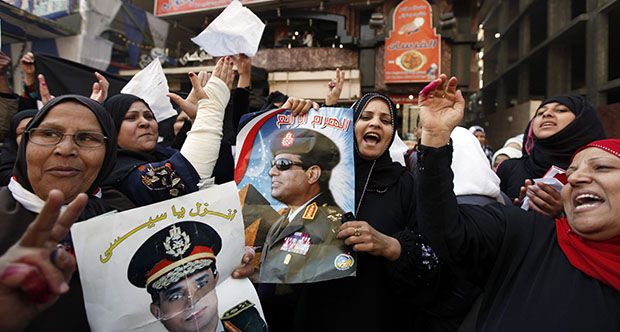 Last week’s constitutional referendum in Egypt yielded a lop-sided result that recalls the non-democratic elections of the decades before the Arab Spring of 2011. Election officials say 98 percent of voters approved the constitution proposed by the military-backed government. Egyptian lawyer Hafsa Halawa cautions against a conventional wisdom that sees this result as a success for the government’s propaganda and the suppression of opponents. The vote represents a turn toward the military to restore the stability that Egypt has sorely lacked in the past years – but is not a free pass for army-backed rule, Halawa writes.
Last week’s constitutional referendum in Egypt yielded a lop-sided result that recalls the non-democratic elections of the decades before the Arab Spring of 2011. Election officials say 98 percent of voters approved the constitution proposed by the military-backed government. Egyptian lawyer Hafsa Halawa cautions against a conventional wisdom that sees this result as a success for the government’s propaganda and the suppression of opponents. The vote represents a turn toward the military to restore the stability that Egypt has sorely lacked in the past years – but is not a free pass for army-backed rule, Halawa writes.
The original demands of Egypt’s 2011 uprising – for an end to massive poverty, corruption and police oppression – are still in force, Halawa writes. “It is inevitable that should the current leadership fail to deliver on those very demands, much like its predecessors did, they too, shall find themselves facing an angry population that will stand up yet again and demand change. No matter how impossible it may seem right now, no leader, not even General [Abdel Fattah] Sisi, is immune to the revolution’s goals.”
As the government aims to restore stability to the the country of 80 million people – for centuries a fulcrum of the Arab world – “there are grounds to be optimistic about the outcome for the economy in 2014,” writes Atlantic Council Senior Fellow Mohsin Khan.
That is partly because Egypt has gotten increased help from the Gulf Arab countries, and partly because of domestic policy decisions, Khan writes.
The essays by Halawa and Khan are part of the Atlantic Council coverage watching for whether Egypt might return soon to a semblance of political stability. The January 14 vote opened three years to the day after the Arab Spring toppled its first autocratic regime, in Tunisia. Since then, Egypt, Libya and Yemen have ousted autocratic leaders, but all four Arab nations have struggled to achieve either political stability or a clear path to democratic governance.
The Council’s EgyptSource blog has followed the referendum with detailed reports, and its editor, Nancy Messieh, has compiled a page of resources that help explain the vote and its implications. To better track the history of these turbulent three-plus years, the Rafik Hariri Center for the Middle East has assembled a timeline charting the progress of the political transitions in Egypt, Tunisia, Libya and Yemen.
How Egypt got here – and what it may mean
In 2011, Egyptians jammed Cairo’s streets to protest corruption, unemployment and repression — and force the military-backed president, Hosni Mubarak, to resign. A year later, the country’s first democratic presidential election gave a narrow victory to Mohamed Morsi, a leader of the Muslim Brotherhood. Last year, Morsi’s claim to sweeping presidential powers and his sponsorship of a draft constitution raised protest among many more secular Egyptians who described his rule as an Islamist attempt to hijack a democratic revolution.
Amid massive street protests against Morsi in June, the military declared his ouster and arrested him. The military’s leader, Gen. al-Sisi, has since dominated a government that itself has faced strong public protest as it banned and suppressed the Muslim Brotherhood and drafted the constitution offered to voters this month.
That vote remains overshadowed by Egypt’s continued political division – notably the government’s plan to put Morsi on trial next month for allegedly inciting the killing of street protesters while he was in office.
The referendum was deeply flawed, according to many Egyptians, including Mohamed El-Dahshan, a Harvard University research fellow. Officials obstructed or arrested people who tried to campaign for a ‘no’ vote, and the repression led Egyptians to joke that the ballot would contain only an option to vote ‘yes.’ El-Dahshan writes from Cairo that “it is clear that the state has all but given up any pretenses of a democratic process.”
Still, Tamer Nagy Mahmoud, an Egyptian lawyer in Washington and member of the Public International Law & Policy Group, says the draft constitution’s text is a glass half full. While the charter will let Egypt’s powerful military continue to dominate civilian political forces, it also guarantees gender equality, bans torture and human trafficking, and takes other steps useful to gradually building a more democratic political system. That process will require years of small steps, Mahmoud says, and despite the charter’s flaws, “the progress made in this proposed constitutions is one such step forward.” With its formal passage, the greater test will be whether Egypt’s state institutions will show the political will to defend the human rights written into this constitution — including whether the Supreme Constitutional Court will assert its independence, notably from the military-dominated political establishment.
Image: Supporters of Army chief General Abdel Fattah al-Sisi shout slogans against ousted President Morsi and members of the Muslim Brotherhood after an explosion north of Cairo on the first day of voting on the constitutional referendum, the first ballot since the military overthrew Morsi and an event likely to spawn a presidential bid by Sisi. REUTERS/Mohamed Abd El Ghany

